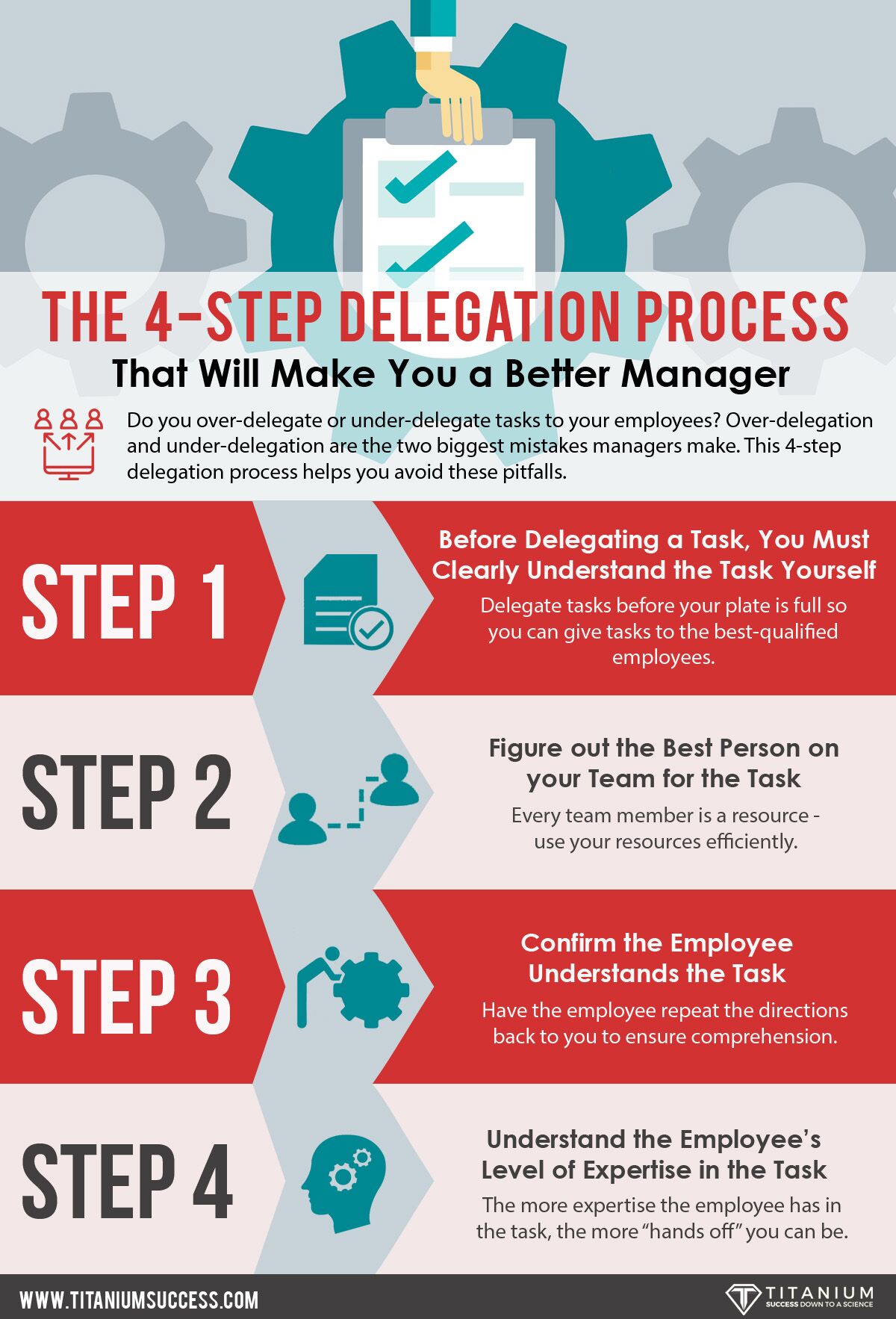Delegating as a CEO is the Key to Live the Life You Want
Are you feeling stressed and overloaded as a manager? Or worse, do you feel like you’re failing and your employees are failing you? Do you feel like you’re not getting enough done?
See, the reality is that there are two main reasons why managers fail, and those two reasons are so incredibly simple that it’s just a matter of understanding what they are and then making sure you take the appropriate steps to avoiding these two mistakes. And interestingly enough, they both involve the concept of delegation, and here they are.
The First Reason Managers Fail is Under-Delegation
Reason number one managers fail under-delegation. Reason number two: over-delegation. It’s as simple as that. So let’s start with defining what a manager is first. I’ve been in business for almost a quarter of a century now, and I have been managing people for nearly two decades.
As a manager, what I’ve realized is that there are simple things you can do to get results out of people. Now, managing people, by definition – what is the definition of management? It’s getting things done through others. So if you are not effectively getting things done through other people, you may have a title of manager, but you’re not really managing.
The key is this: it’s about getting things done that you need done. So whether you’re a business owner and it’s all the employees in the company, or you work in a company as an executive or whatever position, and you have people under you, the key is those people must be knocking things off of your to-do list. Those people must be getting things done that you would otherwise have to do. That’s the definition of management; it’s getting things done through other people.

How to Improve Your Delegation Skills
So if you think you’re a great manager and the way you’re doing things is you sort of have some things that people do but most of the real work you do yourself, you’re not really managing people.
What you’re doing is you’re putting all the stress on yourself, you’re carrying all of this stuff around, and I guarantee you you’re getting done a fraction of what you would normally be able to get done if you learned proper delegation. So if management is getting things done through other people and there are two big mistakes that managers make (under-delegation and over-delegation), how do we make sure that we properly delegate?
Step 1 – Understand the Task Before Delegating
So let’s talk about that. Number one when it comes to delegation, you first have to understand that before delegating a task to someone, you must first completely understand what the task or the responsibilities are, and you have to have clear understandings of it yourself before you try to delegate it to someone.
And yes, I know managers, business owners – you’re busy. It’s really hard to do this. I myself struggle with this more than any other part of this because it’s about sitting down and taking 5, 10, 15, 20, 30 minutes – however long it takes. Sometimes it’s five hours to document something, create what it is that you’re really trying to delegate so that when you give this person instructions on what you’re trying to do, you yourself are clear on what the task is.
And often we skip this step because the reason most of you delegate or most of us delegate is because we’re overloaded and stressed, and so we start dumping things off.
In reality, we should have started before we got overloaded and before we got stressed. But now that you’re there, it’s okay. You’re going to have to slow down a little bit, you’re going to have to take a little bit of time, and one by one, you take these tasks, and you delegate them to someone. But the step that you have to take first is making sure you have a clear understanding of it and documenting it.
Step 2 – Identify the Right Person for the Task
Once you have that, the second step is to identify the right person for this particular task. Now, some of you may not have very many choices in the people you’re managing and the people you can delegate to. But for a lot of you out there, I know you have options.
Whether it’s multiple employees that you can delegate to or you may be able to bring a contractor on for certain things, or you may even be able to hire someone for a specific task that you’re trying to delegate. But the key is you’ve got to understand that the first thing is to understand what the task is and then figure out who is the best person for this task.
Don’t just give it to the first person that comes to your mind or the first person who shows up at your door. Give it to the person who’s best fit to do this.
Step 3 – Confirm the Employee Understands the Task
Then number three is you want to confirm understanding. So when you delegate the task, ask the person to tell you back – now, this could be done over email, it could be in an in-person meeting – whatever it is, you’ve got to get that person to get back to you and tell you, “Hey, yes. This is what you’re asking me to do.” And if you do that 80 percent of the time, the thing the person tells you is not what you actually delegated to them, and this is a big part of the reason why employees will often fail at completing a task or getting a result because they didn’t understand what the goal or the result was, to begin with.
I mean, most people as they’re listening to things, their minds wander. It’s just a natural thing. As you’re listening to this episode of me speaking, your mind is naturally wandering and that’s okay.
That’s just what we do, right? And it’s not that you have ADD or something; it’s just human beings do that. So when someone is sitting there, and you’re delegating a task, then understand that it’s very likely that they didn’t get everything, so tell them to tell you back what you’ve said and then fill in the holes for them and then ask them for confirmation again. But you’ve got to make sure that stuff happens.
In order to make this whole delegation process effective, there’s one other thing you have to do, and that is you have to identify the person to whom you’re delegating this task. What is the level of their knowledge and expertise in this area that you’re delegating to them?
You see, you go to a mechanic to get an oil change and the delegation process is pretty simple. You show up, and you say, “Hi, I’d like an oil change.” They say, “Great,” they have you fill out some paperwork, they possibly ask you some questions like, “Do you want regular motor oil or a synthetic?” You know, they’ll ask you certain questions, right? And then you can just leave it. You can go and come back and magically; your oil is changed.
How nice would it be if in your business it was the same way? Because when you go to get your oil changed, you are going to an absolute expert in the area of automobile services or oil changes or whatever, and they already know what questions to ask you.

The Importance of Delegation in Leadership
But see, most of your employees aren’t necessarily experts in the areas of things you’re delegating to them, and that’s part of why sometimes they fail. But you can make them experts by explaining to them or teaching them the things they need to do and getting clear on what it is that they need to do.
So when you’re delegating that task, and you know that the person you’re delegating to is an expert in that area, it’s a different type of delegation than when you’re delegating a task to someone who is not necessarily an expert in that area.
So the time it takes to delegate a task, and the steps involved and the work involved varies greatly, based on the person’s knowledge or understanding and expertise in the area of what you’re delegating to them, so you have to identify that as you’re delegating to them. Before you delegate it, you figure out, hey, this person has a very high level of understanding of this, so I can just treat it like an oil change.
But then you have someone else who doesn’t have a full understanding of a particular thing, and you have to understand, hey, there’s going to be a lot more work involved in this. And so the first part of when you delegate to someone, a lot of times what happens when people over-delegate is they just throw things off of their plate, give them to someone, and they delegate it and forget it.
This is the worst thing you can do as a manager because your employees will almost certainly not follow through with tasks like this or very few people in the world who have the ability to just have a bunch of stuff delegated to them and just follow through without too much oversight or without too much involvement early on.
The Delegation Process for Management
So what you want to do is early on you want to be as involved as necessary. Even in the oil change, right? Early on when you’re giving them your keys to your car, and you’re talking to them and getting the paperwork done, you’re very involved, and then you can completely disengage. You can go get lunch somewhere and come back and magically your oil change is done. In business, it’s the same thing. So early on in the process, you have to be very, very, very involved.
Another example would be when you go to get your hair done. You sit down, and you explain to the person exactly what you want. So for the ladies, let’s say you’re going and you’re going to get a cut, you want to get some highlights done or something else.
See, there’s a lot of explanation to do there. You’ve got to tell them what length you want and what type of a cut you want. If you’ve never been to this person before, maybe you look at some magazine pictures, and you say, “Hey, these are the kinds of ones I like.” They tell you what they think. You sort of talk about how much you want to take off of it. “Okay, you want to get highlights?
How much highlights do you want? What color do you want? What shades?” this, that, and there’s a lot of talking going on, right? There’s a lot of involvement by you. But then if you put in all that time up front and you’re very, very involved early on, guess what happens? Later you get to completely disengage, and that’s where some of you make the next mistake in the delegation process, and that is you try to stay involved throughout the entire process and you wonder why your employees fail, or you wonder why you’re stressed and overloaded.
See, if you don’t do a proper job up front of explaining to your hair stylist exactly what it is that you’re trying to do, now throughout the entire process you have to be, “Oh, no, no, no! Don’t cut it there. No, no, cut it here. Oh no, that color’s not going to work. Let’s change the color here. Let’s change this. Let’s change that.” And if you do that, eventually what you do – well, in a hair salon, they’ll just throw you out and say, “No thank you. We don’t want your business.”
But in business, your employees will do whatever the heck you tell them to do, and they don’t care. They’re sitting there doing their job, and even the best employees in the world will let you stay involved with hands all over this thing and eventually they’re going to fail because number one, you’re going to run out of time. They’re not going to get the best results they can because you’re overly involved in the process and they’re never going to own it.
So the key then is early on you want a lot of involvement. You want to make sure you train the person correctly. You explain to them what the results are and if it’s something that’s a big project, maybe you’re very involved in the first step of the project to make sure that they’re getting the results early. But then once they’re on a roll, you must disengage.
You cannot remain engaged, and when you do, that’s called what? That’s called micromanagement. It’s when you’re fully involved in the process, right? So that first part then is critical because if you are truly going to disengage so, you can go do what you do best – and this is one of my favorite things that I love teaching people. Even when it comes to my vendors or it comes to our customers, I try to explain it to them. I say, “Hey, let us do what we do best so you can do what you do best.”
In my marketing company, for example, people often try to be overly involved in the marketing process and the clients who are overly involved with what we’re doing on their website and what we’re writing for them and this and that, they almost always – interestingly enough – get the worst results.
Isn’t that interesting? Now, of course, you have to be involved enough to know that the company you’re using is getting the job done. But being overly involved, what it does is it doesn’t allow us to do what we do best, and guess what? Those are the clients who are typically dissatisfied because they’re wasting too much time on marketing. At some point, they start to think, “Well hey, I should just be doing it myself.”
This is What Happens if You’re Overly-Involved Through the Whole Process
See, that’s exactly what happens with your employees. If you’re overly involved with the process, what you’re doing is you’re decreasing what they’re able to do, and you’re stressing yourself out.
So there’s a right amount of involvement and most managers, what they do is early on they’re not involved enough then later on or in the middle of the process, they’re overly involved. Isn’t that interesting? And at the end, they forget about it, so we’ve got to completely reverse this thing.
Early on, we plan appropriately; we select the right person – that’s all planning. Then we have a meeting or whatever it is – an email or a delegation process where we offload this thing to the person, but we give them as much information as we possibly can and early on we stay very, very involved. But once you see, okay, this person looks like they’re headed in the right direction, you must disengage and allow them to take ownership.

How to Properly Disengage from the Task
Now when you disengage, it doesn’t mean that you completely forget about it. Every once in a while, you come back, and you take a peek, right? You do a little sniffing around. What’s going on? And depending on the person’s expertise, if your uncle is going to change your motor oil for you and you don’t know how good he is, you might stick around the car and peek every once in a while and make sure he’s not doing anything crazy.
But when you do it with a mechanic, you leave and come back an hour later. So you’ve got to know then who you’re delegating to and what their level of expertise is to know how often you’re checking in on them.
So for some employees, I tell them to inform me every time they make a step in the process, they take a step. But see, I’m not micromanaging what they do; I’m just telling them to report to me – that’s okay.
But with other employees, I say, “Hey, you know what? Just tell me at the end of the day what you accomplished,” because they already know what they’re doing and I believe that they’re knowledgeable enough in this task or in this area that they can get the results. In some cases, I say, “Report to me next week.” So you set these guidelines or deadlines where they can come back to you, but the key is you must be able to delegate and at some point disengage.
But then what happens next? Most managers at this point never go back to see the results – until poop hits the fan. So they’re stressed and overloaded and the things they do delegate, they delegate and forget about it.
You cannot do that because you have to go back and at the very end you must get absolutely reengaged again. And in the motor oil example, it’s where you get in the car and make sure that the oil light is off now if it was on before.
In the hair process, looking at your hair in the mirror and making sure is it the right length, is it the right color, is it the right style, and if it’s not, that’s the time to say something, right? Not just run out of the hair salon without looking at your hair and then wonder why it didn’t turn out so well, and then wonder why next time it’s messed up again. So you’ve got to get involved right there and check the results.
Now when you’re checking for results, you all know how I feel about key performance indicators – KPIs. So if you have something that you’re delegating and you have adequate KPIs so that you don’t have to look at every single detail of how someone did something, but instead you can judge them based on the results, now you have the secret to effective delegation.
So let’s put this all together and see what it means, because when you’re sitting down, and you’re planning, now you not only have to know what the job is that you want to get done and who you’re going to give it to. But you also have to know some of the how, because you need to teach the person what to do unless of course, they’re the expert and then the training is not a part of it and you’re not a coach; you’re just a manager.
Step 4 – Have a Documented Way of Measuring Results
But then the fourth thing is you must have documented ways of measuring the results you’re going after and communicate that with the employee.
Now in sales, it’s easy.
You tell them how much you expect them to sell. But in other things, more operational tasks, it’s more difficult but you’ve got to figure out and explain to them how you’re going to judge the results that they’re going to get, and then you judge them based on those things.
So you tell them the KPIs, and then you look at their KPIs. Now, the best type of delegation is the type where there are some KPIs along the way. If you have certain KPIs along the way, now you can watch those numbers and make sure the person is on track. But then afterwards at the end, you can check the final numbers.
So I’ve talked to you a lot about management and delegation today. There’s a lot more to this topic, and in future episode, I’m going to dig deeper into some of these different areas.
But remember, management is getting things done through other people, and the following is a huge myth. People will say, “If you want the job done right, you’ve got to do it yourself.” BS. If you want to be stressed, overloaded, and never grow your company or your department, then you should do everything yourself. Or some people say, “I’ll do the best job here, so I’m going to do it myself.”
The 70 Percent Rule for Creating Systems
No, it’s not about who can do the best job. Yes, I know you can often do a better job than many of your employees. That’s why you’re the manager. But you’ve got to learn to delegate. And if you’re familiar with my 70 percent rule, create systems that they can follow that even if they do it only 70% as well as you, they’ll still get the results.
Or some people will say, “No one else knows how to do this.” Well, teach someone else how to do it. Or some people will say, “Oh, it’s a boring job,” or, “It’s a really hard job, so I’ll lead by example and do it myself.” Again, not a very good tactic.
Now, you can often lead by example and you should, but not as a regular way of doing your work. Or finally, people will say, “It’ll be quicker if I just do the job myself.” Well, of course, it’ll be quicker for one task or two tasks or three.
But then when you’re up to 50, now you’re stressed, you’re overloaded, and you’re frustrated, you hate your job, you hate your employees, they’re not getting results, and guess what? You don’t get results. So even though you could have done the best job at this task, yes, if you had five of them, you could do it better than anyone else. But you don’t have five, right? So you’ve got to stay focused on that and make sure that you don’t make these mistakes.
Defining Over-Delegation
So, what are the two biggest mistakes? Over-delegation and under-delegation. What’s over-delegation? Over-delegation is when you just dump things on people and forget it. Under-delegation is when you just do everything yourself. Now, most of us are making both of these mistakes simultaneously, over-delegating in certain areas and under-delegating in others.
Because if you are under-delegating, now you have a lot on you, right? So then you finally get to the point where you’re about to explode, and you’ve got to delegate some stuff and guess what? When you delegate in that method, now you don’t have time to explain it to someone or check on it or do all that stuff, right? And then we get into micromanagement later because the task starts to fail or the project starts to fail, and then we have to get involved.
So make sure you focus on being a good manager, getting things done through other people. Take good care, by the way, of those employees who take good care of you and your company, because those are the people who are going to help you get to that next level. Always make sure if you have the option, hire an expert for the tasks that you’re delegating.
Of course, that’s not always an option. But when you do, hire an expert, so you’re more likely to get the results. And just like you wouldn’t delegate changing your motor oil or getting a haircut to me, then don’t delegate things to your employees that they don’t know how to do, and if you’re going to do it, make sure you train them properly.
Hey, I’m really excited about the awesome feedback I’ve been getting every day on Facebook, through email. I get all this feedback from you about how much this podcast is helping you. So if you really like this podcast, please tell your friends and family about it, make posts on Facebook, Twitter, Instagram, wherever else you like to hang out online.
Make posts about your favorite topics and be specific about what you got out of it. So if you love this episode, go now please, make some posts, let other people know about it. I put a lot of effort into this, and this is purely for the purpose of adding value to the world and helping people succeed. So if you’re enjoying this stuff, share it.
I love you guys, and I’m always here to help you as your business coach, as your coach in every area of life. Whatever you need, I’m here for you. Get out there today and most important of all, lead with your heart.




